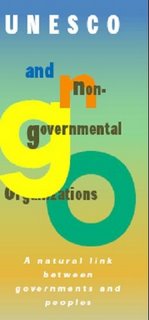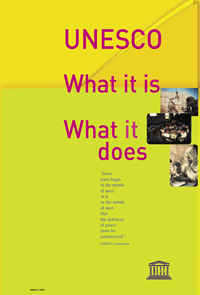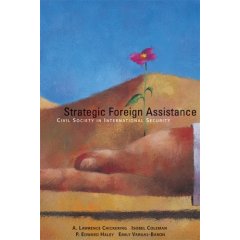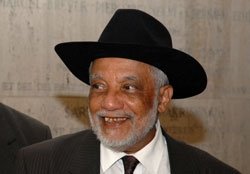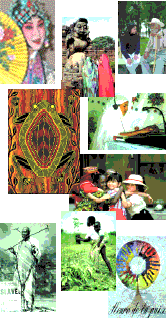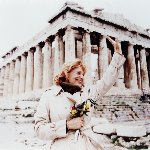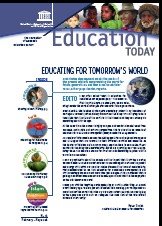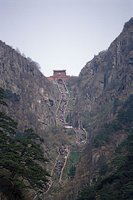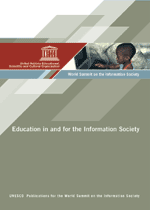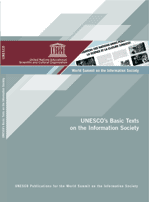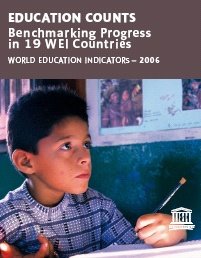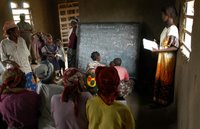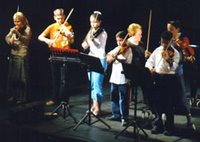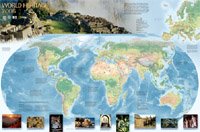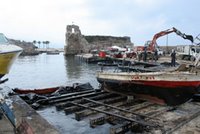Read the full, 172 page progress report on the first six months of UNESCO's 2006-7 biennium program from the Director General.Key sections of the report providing overall assessments of the Education and Culture programs are quoted in their entirety below:
Education"Developments that emerged from the recent G8 Summit in St Petersburg and the two Ministers of Education meetings – the E9 Ministerial Meeting, Monterrey, Mexico, 14-15 February 2006, and the G8 Ministerial Meeting on Education, Moscow, Russia, 1-2 June 2006 – are setting the political context in which the implementation of Major Programme I is taking place this biennium. At a more operational level, the EFA Global Action Plan and the outcome of the ED Sector Reform are redefining new parameters for the functioning of the Organization at the global, regional and country levels.
E9 and G8 Ministers of Education Meetings"The Monterrey Declaration of the E9 and the Moscow Declaration of the G8 Ministers of Education affirmed the important role education has in promoting personal fulfilment, social cohesion and socio-economic development. The Declarations also note that modalities of South-South as well as triangular (North-South-South) cooperation are crucial to advancing the EFA agenda set in Dakar. As an initial step, a focal point has been designated within the Education Sector and pilot projects are in the process of being identified in order to initiate a programme on South-South cooperation. Both meetings came out highly encouraging of the elaboration of the Global Action Plan.
EFA Global Action Plan"UNESCO’s leadership in coordinating action to achieve EFA goals, as well as its central role in implementing the Global Action Plan affirmed by the Ministers of the E9 and G8 nations, has provided UNESCO with the crucial political support and gave weight to the intensive and extensive consultations with the other EFA convening partners. The Heads of the five EFA convening agencies, who gathered at the UNDG Principals’ Meeting, Geneva, 12 July 2006, agreed on the principles of the Global Action Plan and pledged to continue their consultation process and to present a more fully developed version of the Plan to the sixth meeting of the High-Level Group on EFA. The Global Action Plan received further support at the G8 Summit, St Petersburg, 16 July 2006, with the Heads of States explicitly welcoming “efforts by UNESCO to finalize the plan to achieve EFA goals and to provide a framework for coordinated and complementary action by multilateral aid agencies in support of country-level implementation” in a Declaration on Education for Innovative Societies in the twenty-first century.
ED Sector reform and programme execution"Notwithstanding the ED Sector Reform process, the theoretical target of 25% for the first six months of the biennium was missed by a relatively slight margin with the expenditure rate standing at some 21% as of 30 June 2006 excluding the UNESCO Institutes. As the Sector enters the first phase of implementing the reform on 3 July, efforts are being made to minimize the disruption anticipated for the two-month transitional period to ensure that the momentum of the past six months will continue throughout the biennium. The Vision, Mission and Strategic Objectives of the ED Sector, which have been identified and defined within the overall framework of UNESCO’s mandate in education as part of the reform process, will guide the work of the Sector. In line with these new strategic directions, necessary adjustments of the work plans will be undertaken in the coming months to ensure that Major Programme I will be more focused with a viewing to achieving optimum results."
CultureUNESCO’s integrated approach with regard to cultural diversity"In accordance with the principal priority of Major Programme IV, Promoting cultural diversity, with special emphasis on the tangible and intangible cultural heritage, the Culture Sector continued implementing activities within the framework of the strategic objectives defined in document 31 C/4 as regards the implementation of normative action in the cultural field, policy dialogue and formulation notably at the regional and subregional levels and capacity-building at the national and country levels.
The global level"The end of the previous biennium was marked by the adoption of the 2005 Convention for the Protection and Promotion of the Diversity of Cultural Expressions, which completes the building of UNESCO’s normative apparatus in favour of cultural diversity.
"The major challenge will continue to be ensuring a mutual interaction within this normative apparatus since culture can only be understood in its globality.
"Such protection and promotion was probably best exemplified over the assessed period through the early entry into force of the 2003 Convention for the Safeguarding of the Intangible Cultural Heritage in April 2006, filling a major gap in the identification and protection of the most vulnerable living forms of cultural diversity. The massive number of ratifications, which surpassed expectations, facilitated the holding of the first Assembly of States Parties to the Convention, earlier than foreseen, in June 2006. It achieved its mandate of electing the members of the Intangible Cultural Heritage Committee and of adopting its Rules of Procedure.
"Cultural diversity was also advocated through policy formulation and the intercultural dialogue it affords. In this context, pursuant to the adoption by UNESCO’s Executive Board of Decision 174 EX/46 on Respect for freedom of expression and respect for sacred beliefs and values and religious and cultural symbols, UNESCO’s participation in the African Regional Conference on the Dialogue among Cultures, Civilizations and Peoples, in June 2006 as well as in the third High-Level Group Meeting of the Alliance of Civilizations in Dakar, Senegal, reaffirmed the need to promote dialogue as a means of transcending cultural and religious differences. Cooperation platforms have also been expanded with partner institutions such as ISESCO, ALECSO, the Alliance of Civilizations, ASEM, the Permanent Forum on Indigenous Issues, the Anna Lindh Euro-Mediterranean Foundation for Dialogue between Cultures and United Cities and local Governments, in order to strengthen actions to promote intercultural dialogue. In the same spirit, UNESCO contributed to the adoption of the United Nations Declaration on the Rights of Indigenous Peoples by the Human Rights Council in June 2006. The Declaration specifies that countries shall take effective measures to ensure that State-owned media duly reflect indigenous cultural diversity. In the framework of the Slave Route Project enhancing knowledge on the cultural interaction generated by the slave trade and slavery, its International Scientific Committee was restructured and a new project strategy was prepared and adopted in February 2006, aiming at expanding research and documentation of such interaction in neglected geographic areas such as the Caribbean. A meeting on “Sites and Places of Memory”, held in Havana in May 2006, defined conceptual and methodological tools to identify and document sites and places of memory of the Slave Route in Cuba, Dominican Republic, Aruba and Haiti.
"In order to further document challenges and prospects of the concept of cultural diversity from an intersectoral and international perspective, the preparation of the second edition of the UNESCO World Report has been initiated as well as the identification of international experts and the establishment of a research framework for cultural statistics with UIS.
Regional and subregional levels"Policy-dialogue and formulation has concentrated on contributing to major subregional initiatives aiming at harnessing culture in development processes, notably through UNESCO’s association with the sixth ordinary session of the Assembly of Heads of State and Government of the African Union (Khartoum, January 2006), which was devoted to education and culture. It reaffirmed that African integration is to be strengthened by the renovation of education systems and their deeper anchorage in African cultural contexts in order to achieve the sustainable development of the continent and a true regional integration. The production of and access to knowledge, and the urgency of rethinking educational contents in a sociocultural perspective were identified as being crucial in that respect. The crucial role of African languages and mother-tongue education was also emphasized through the establishment of cooperation with the African Academy of Languages (ACALAN). By the same endeavour, subregional efforts also led to the creation of a new subregional UNESCO Chair devoted to the preservation of West African cultural heritage through an agreement between the University of Togo and UNESCO in April 2006, with the aim of enhancing the ancestral spiritual dimension of cultural heritage of a number of West African countries (notably Benin, Ghana and Burkina Faso).
"Similarly, following UNESCO’s commitment to promoting dialogue among political leaders of South-East European countries initiated at the first regional meeting in Ohrid (2003), and pursued at Tirana (2004) and Varna (2005), UNESCO was called to participate and assist Mr Stjepan Mesić, President of Croatia, in the fourth Regional Summit Forum of South-East Europe on “Communication of Heritage” in early June 2006 in Opatija (Croatia) in cooperation with the Council of Europe. The Summit offered an opportunity to consolidate and expand the scientific and cooperation linkages between South-East European institutions and UNESCO. The “cultural corridors” initiative, which was launched in Varna in 2005 and aimed at enhancing the fundamental role played by cultural heritage in promoting intercultural dialogue in the subregion, was further developed. The Summit adopted the Opatija Declaration promoting cultural diversity as a defining factor in South-East Europe and calling for the definition of a related Action Plan on the cultural corridors of South-East Europe.
Country level"Drawing from the constructive force of cultural diversity, which allows for its potential for dialogue, efforts have been also deployed at the national and country levels through a number of initiatives celebrating cultural diversity worldwide, notably by: World Day for Cultural Diversity for Dialogue and Development, which was celebrated worldwide on 21 May 2006; World Poetry Day on 21 March 2006, which reaffirmed the role of poetry as a bridge between individuals and groups and commemorated the centenary of the birth of the great philosopherpoet, Léopold Sédar Senghor; and the celebration of Turin as World Book Capital in March 2006. Similarly, the eleventh celebration of World Book and Copyright Day on 23 April 2006 afforded another opportunity for political decision-makers, economic operators and civil society stakeholders to honour books, emphasizing their multiple roles in the educational, cultural and economic spheres of societies. On this occasion, the linguistic dimension of publishing was underscored, stressing that, more than ever before, books be regarded as vehicles of vitality and language recognition and posing the dilemma regarding the role that the publishing industry can play in facilitating access to quality education for all that is adapted to learners’ needs in terms of the choice of languages available.
"Efforts at country level have also been made in post-conflict situations. An overall Culture Sector strategy for post-conflict intervention was developed acting upon two interrelated levels of action, thereby demonstrating UNESCO’s relevance and delivery capacities aimed at promoting a culturally sensitive development using culture as a resource for development; and fostering an inclusive dialogue among all the country’s stakeholders using culture as a tool for reconciliation. Building on past experience in this field, efforts were directed at supporting national mechanisms for promoting policy dialogue and consolidating national unity and respect for diversity. Cooperation between field offices and Headquarters improved considerably with regard to ensuring systematic monitoring of operational projects in postconflict situations. UNESCO has continued advocating the integration of Culture as a preliminary component in the rebirth of post-conflict countries, notably through its active participation in the United Nations Joint Assessment Missions and processes, notably in Sudan and in Somalia.
"Efforts to strengthen UNESCO’s country-level presence in the area of culture have been enhanced, notably by providing UNESCO field offices benefiting from the presence of programme specialists in the area of culture with a supplementary allocation of 1% of the regular programme budget in order to lead country-level programming activities (CCA/UNDAF/SWAP). Substantial contributions have been made to the United Nations country-level programming and other national planning exercises of different countries including, among others, Bhutan, Costa Rica, Cuba, Jordan, United Republic of Tanzania as well as the Poverty Reduction Strategy Paper (PRSP) for Zanzibar. Similarly, the inclusion of the protection and promotion of cultural diversity in CCA and UNDAF has been achieved in a number of countries in Asia and Africa."

